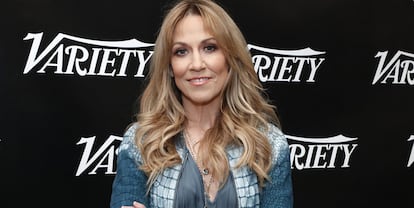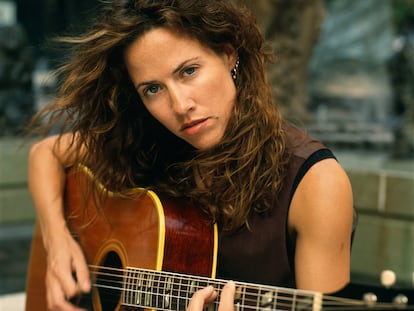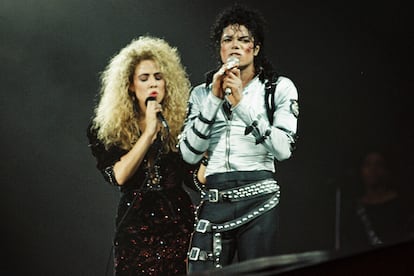At 60, Sheryl Crow tells the truth about Lance Armstrong and the sexism she experienced as a young woman
The singer of hits such as ‘All I Wanna Do’ and ‘Soak Up The Sun’ became tabloid fodder for her relationship with Lance Armstrong. In a new documentary, she reflects on her career, revisits her controversial moments and reclaims her musical legacy

“Watermelon, watermelon, peanut butter, peanut butter, watermelon…” Her fingers plugging her ears, Sheryl Crow repeats the words like a mantra to avoid hearing an interviewer’s question about a major music magazine’s criticism of her. The image, dating from the late 1990s, opens the first documentary about the musician. It captures much of the singer’s image and character: despite winning nine Grammy Awards and selling more than 50 million records, the singer’s success has been undermined by the press and cannibalized by tabloids that saw her as a perfect victim in a pre-Me Too era. Now, she is taking this cultural moment to claim milestones on and off the stage that have made her one of music’s most “underrated” stars.
“I’m like a cat with nine lives…Although the truth is that I must already be on my eleventh,” says the 60-year-old singer. She is not wrong. Crow is a key reference for 1990s rock and the MTV generation. Stars including Taylor Swift, HAIM, Olivia Rodrigo and St. Vincent have cited her as a musical influence. Sheryl, which has just premiered on Showtime, is a hagiography designed for fans (her manager produced the documentary). It works well as a chronological retelling, but falls short when it comes to delving into the artist’s legacy, beneath the surface of a personal journey full of both milestones and potholes. The musician, who agreed to participate in the project out of boredom caused by the pandemic, acknowledges that she has “always had very high highs and very low lows.” The documentary, which mixes material from the singer’s private archive with unpublished images shot during a tour, also features statements from figures such as Keith Richards and Laura Dern, who describes Crow as the voice of a generation.
The daughter of a piano teacher and a lawyer who in his spare time played trumpet in jazz bands, Crow describes herself as a music geek from a very early age. She went to college in Missouri, her home state, and began working as a high school music teacher while devoting her afternoons to playing in a rock cover band. Her life took a turn when she voiced a McDonald’s television commercial. With the paycheck she earned from that job, she decided to leave it all behind and move to Los Angeles to try to forge a career as a singer.

This was the mid-1980s, when successful female solo artists could be counted on the fingers of one hand. Her path was not much easier than those of contemporaries like Tracy Chapman or Fiona Apple. After touring every studio in town with her demo in hand, Crow settled for waitressing, until her big break as a backing vocalist on Michael Jackson’s international Bad tour in 1987. In just a few months, she exchanged a coffee shop counter for crowded venues with tens of thousands of people, where she wore an eighties wig to perform a duet of I Just Can’t Stop Loving You with the King of Pop.
Her biggest break, though, would come along with problems caused by the rampant sexism, which she has publicly denounced since long before such conversations were common. Tabloids published several articles branding her as Jackson’s new romantic interest. They even wrote that the singer had offered her $2 million dollars to be the mother of his child.

Behind the rumors, which sought to give the singer a semblance of masculinity and put an end to speculation about his sexuality, was the artist’s manager, a gangster named Frank DiLeo. Crow also reveals that the businessman offered to produce her first solo album–”he guaranteed me it would be at the top of the charts” in exchange for continued sexual harassment, which forced the young woman to fight “a constant battle to get away from him.” When she tried to seek help, she heard a phrase common for actresses, models and singers in positions of professional privilege: “Others would die to be in your situation.”
The situation plunged her into a deep depression, which momentarily distanced her from the front lines of the music industry. She retraced her steps and began to make a name for herself as a singer-songwriter. In 1993, well into her thirties, she released the feel-good anthem “All I Wanna Do,” a best-selling hit that made her a star and remains her greatest success to this day. Prince, Eric Clapton, Stevie Nicks and the Rolling Stones invited her on stage with them. In her Los Angeles mansion she celebrated New Year’s Eve parties with 800 guests, where “everywhere you looked there was a celebrity.”

Sheryl’s relationship with cyclist Lance Armstrong also became fodder for the tabloids. The artist chose to put her career aside to accompany the famous athlete, even moving to Girona in Spain with him during his training. The doping case that ended Armstrong’s Tours de France also ended their relationship. “He lied to me, too,” she says. Then, Crow underwent a routine mammogram that detected cancer. She says she lost “faith in humanity” when dozens of paparazzi camped out for weeks outside her home to hunt for, she says, “a photo at her lowest moment.”
Thanks to its early detection, the disease subsided after months of treatment. The artist took advantage of the situation to turn her life around. In addition to becoming a fierce advocate for the fight against breast cancer, she left Los Angeles and moved to Nashville. She also fulfilled her longings for motherhood by adopting two sons, Wyatt and Levi, in 2007 and 2010 respectively. As a single mother, she has self-imposed the three-night rule: she forbids herself from sleeping more than three nights away from her children.

Although she continues to release music in different formats, and she also composed original songs for the documentary, she has confirmed that she will not record another studio album. The new Sheryl Crow no longer covers her ears to block out what others say about her. Now she calls the shots. As she sums it up at the end of the film, she is still trying to learn, but she will continue to do things that express herself and make her proud.
Tu suscripción se está usando en otro dispositivo
¿Quieres añadir otro usuario a tu suscripción?
Si continúas leyendo en este dispositivo, no se podrá leer en el otro.
FlechaTu suscripción se está usando en otro dispositivo y solo puedes acceder a EL PAÍS desde un dispositivo a la vez.
Si quieres compartir tu cuenta, cambia tu suscripción a la modalidad Premium, así podrás añadir otro usuario. Cada uno accederá con su propia cuenta de email, lo que os permitirá personalizar vuestra experiencia en EL PAÍS.
¿Tienes una suscripción de empresa? Accede aquí para contratar más cuentas.
En el caso de no saber quién está usando tu cuenta, te recomendamos cambiar tu contraseña aquí.
Si decides continuar compartiendo tu cuenta, este mensaje se mostrará en tu dispositivo y en el de la otra persona que está usando tu cuenta de forma indefinida, afectando a tu experiencia de lectura. Puedes consultar aquí los términos y condiciones de la suscripción digital.









































